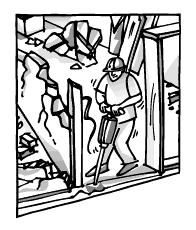 Prime Minister Girija Prasad Koirala and his Seven-Party Alliance (SPA) colleagues probably still nurse grievances from the 1990-2002 phase of Nepali democracy. All those noises over corruption, nepotism, abuse of power, indifference from civil society organizations, the media and a motley crew of unelected and unaccountable quarters.
Prime Minister Girija Prasad Koirala and his Seven-Party Alliance (SPA) colleagues probably still nurse grievances from the 1990-2002 phase of Nepali democracy. All those noises over corruption, nepotism, abuse of power, indifference from civil society organizations, the media and a motley crew of unelected and unaccountable quarters.Yet the SPA constituents probably weren’t expecting the Demolition Derby to swing back so fast and strike so hard.
Take Dr. Devendra Raj Pandey’s statement absolving royalists of any role in the Madhes conflagration. What impelled our embodiment of civil society to jump to such a sweeping conclusion against the ruling elite’s accepted wisdom?
Certainly not any residual nostalgia for the royalist decades that allowed him to climb the Finance Ministry ladder all the way up to the secretary’s wing before he made a virtue of insubordination to the premier on the eve of the referendum in 1980.
In fairness, Dr. Pandey may have been truly overwhelmed by the genuineness of the Madhesis’ grievances. His conclusion may even be considered an act of contrition for his own inability to address the Terai’s concerns in his various incarnations in public life.
But how does that rule out the possibility of extraneous fishermen riveted on their own catch in the troubled waters? Surely Dr. Pandey’s failure to recognize familiar faces in the angry crowds could not have automatically empowered him to pronounce an acquittal verdict.
The most plausible explanation may sound the most cynical. But Dr. Pandey may have come to the royalists’ rescue only to embarrass the Koirala government. Of course, it would be unfair to single him out here. Daman Nath Dhungana is still infuriated by the SPA’s cold-shouldering of civil society while appointing representatives to the interim legislature and is quite candid about that.
Although he hasn’t expressed any such sentiment in so many words, Padma Ratna Tuladhar must be in discomfort now that Prachanda can meet Koirala in full public view. (Krishna Pahadi must be doubly injured, now that the Madhesi movement has, in the words of one astute blogger, regionalized his aura.)
The restoration of the democratic process has encouraged the media, too, to revert to subversion. The Fourth Estate, which considers itself the sole claimants to the invulnerability it despises in despots it sees everywhere else, has squandered few opportunities to undercut the new aristocracy. The timing of all those SMS polls, inquiries into royal finances and assertions on how Madhesis have not received such a raw deal makes their underlying content suspect.
Most Nepalis now recognize how easily and equally power can be abused under palace or party rule. They are perceptive enough to extrapolate the extent these ills would reach under the Maoists.
If the SPA-Maoist alliance was deemed good enough to marginalize the “autocratic” palace then maybe the constituents are good enough to try to navigate through the choppy seas. At a minimum, those who hailed the House of Representatives Proclamation as Nepal’s Magna Carta shouldn’t be the first ones baying for the drafters’ blood.
As to the royalists, since the government continues to hold the three ex-ministers regime, we can proceed on the premise that they may have had a hand in the southern inferno. What’s the next logical step? One weekly had a prudent solution: the government should start talking to them.
What do the royalists want? Undo the historic House of Representatives proclamation and restore to all those state institutions the royal prefix? They’re smarter than that. All that hobnobbing with the Hindutva crowd in Birganj last April couldn’t save the royal regime.
Are the royalists fanning the riots to remind us that the only time an authentic Madhise ever rose as high as the deputy premiership under a palace-appointed government (before accepting a demotion months later)? Or is Badri Prasad Mandal a mandale before he is a madhise?
Maybe the royalists want us to make up our minds on who we really are – a collection of conquered peoples consumed by our ancient hatreds or a community of communities that can still try to make the most of our diversity? That National Unity Day, in other words, should have a place on a republican calendar?